FOCUS ON GEORGIAN GLASS MARKET
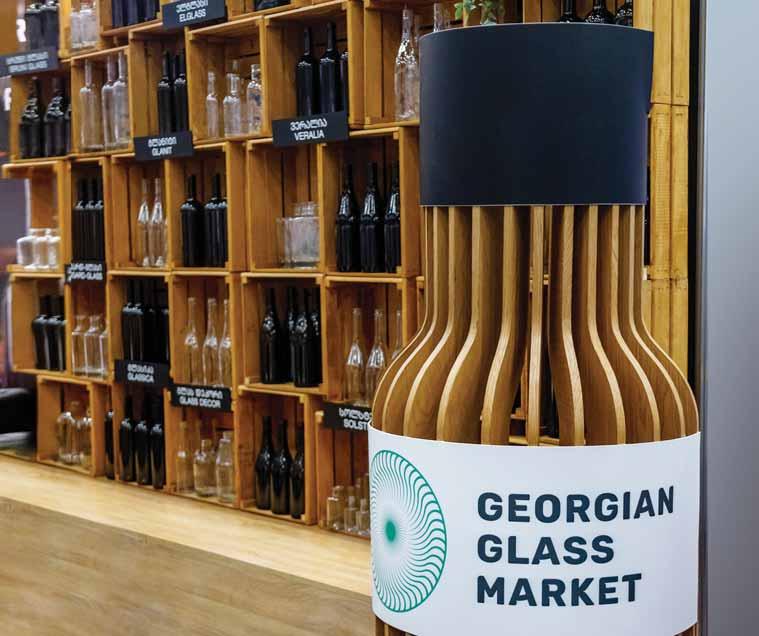
In this week’s
Ukraine Latest: Ukraine Strikes Russian Missile Systems in Crimea as Kyiv Faces Drone Assault
3
EU Elections 2024 Results & Consequences
4
WinExpo Experts Claim Georgian Wines Have Increased in Quality
FUTURELAB - Georgian Teams with Innovative Startup Ideas for the US Market to Be Funded and Supported
Ethno-Georgia-2024
"I Tidy Up Georgia" - Fourth Stage of the Clean-up Series
BY VAZHA TAVBERIDZE


The Legacy of Alexander Toradze: 10-Hour Epic Rachmaninoff Marathon Opens Toradze Festival
Carrefour Introduces New Football Campaign to Support the National Team of Georgia
Issue no: 1454 • • JUNE 14 - 20, 2024 • • PUBLISHED WEEKLY
issue... PRICE: GEL 2.50
POLITICS PAGE
POLITICS PAGE
SOCIETY PAGE
SOCIETY PAGE 9 CULTURE PAGE 10 BUSINESS PAGE
BUSINESS PAGE 6 SPORTS PAGE 11 Continued on page 5
8
6
The largest importer of glass tar and packaging materials in Georgia, simplifying the work of wine sector entrepreneurs PAGE 6
Mark Galeotti is a British historian, lecturer and writer on transnational crime and Russian security affairs, and director of the consultancy Mayak Intelligence. He is an honorary professor at the UCL School of Slavonic and East European Studies, and an associate fellow in Euro-Atlantic geopolitics at the Council on Geostrategy. Radio Free Europe/RL’s Georgian Service sat down with him to get insight on Putin’s and Russia’s present and future standing, and to take a prediction on Georgia and Ivanishvili. Referencing his latest book, we began by asking him about Prigozhin. “Prigozhin’s death allowed us to arrive to a definitive conclusion, the final chapter, so to speak,” he says. Mark Galeotti on Putin’s Rise and Eventual Fall, and Georgia’s Inescapable Curse
INTERVIEW
Mark
Galeotti. Photo by Vladimír Šimícek
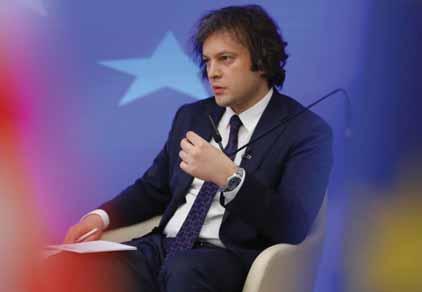
PM: Signs of a Democratic Crisis at the EP Elections
BY ANA DUMBADZE
One thing we can say: Signs of a crisis have appeared on the basis of these elections, this is a democratic crisis, – Prime Minister Irakli Kobakhidze said, evaluating the elections of the European Parliament.
The head of the government noted that Georgia’s foreign policy priority is integration into the European Union, therefore the government is paying special attention to the processes happening in the EU.
“In reality, there will be some changes, but the development of events will continue as it was before. One can say that
some signs of a crisis have appeared on the basis of these elections, which is a democratic crisis. I am convinced that Europe will overcome this crisis in the medium term. It is in everyone’s interest.
“Our foreign policy priority is integration into the European Union, therefore we are paying special attention to the processes in the European Union. Of course, it is in everyone’s interest to make the political processes in the European Union as healthy as possible,” he added.
As a result of the April 6-9 elections, the European People’s Party and the Social Democrats remain the dominant forces in the European Parliament. The representation of the far-right has slightly increased and the representation of liberals and greens has decreased.
Tbilisi Named European Capital of Sport 2025
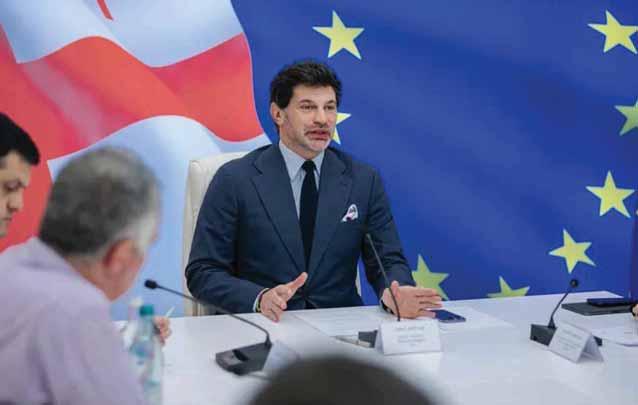
Based on the assessment of AECS Europe, Tbilisi has been named European Capital of Sport 2025, – Tbilisi Mayor Kakha Kaladze announced at Thursday’s session of the municipal government.
He claimed that, in recent years, together with the Football Federation, many projects in the direction of sports have been implemented in the capital city.
“I want to give you some happy news: Tbilisi has a new status – European
Capital of Sport 2025. We applied for this status for the first time, knowing we deserved it, but the decision of AECS Europe, coming after the presentation of the candidates, to name Tbilisi as the European Capital of Sport 2025, came as a pleasant surprise,” Kaladze noted.
The mayor of the capital noted that this status is proof of the correctness of the policy pursued by the municipal government in the direction of sports.
“In recent years, a lot has been done in the direction of sports in the capital.
I would like to thank the Football Federation for its cooperation. Many football schools of European standards have been organized in Tbilisi; in recreational spaces, we pay special attention to the arrangement of sports spaces and training zones, so that representatives of all generations have the opportunity to train.
“Within the framework of the project, our delegation will go to Brussels, where the programs to be implemented in 2025 will be agreed on,” Kaladze concluded.
EU: We Regret Increasing Acts of Intimidation, Physical Assaults on Civil Activists, Political Leaders in Georgia
EU Foreign Affairs and Security Policy Lead Spokesperson, Peter Stano, on Wednesday said, “The European Union regrets the increasing number of reported acts of intimidation, threats and physical assaults on civil society representatives, political leaders, civil activists and journalists in Georgia.”
According to Stano, “The EU once again, calls on the Georgian authorities to put an end to these negative developments and investigate the documented

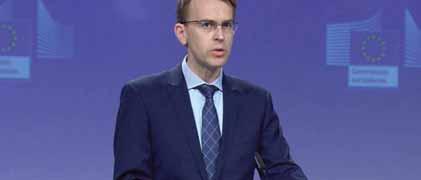
Nordic Days: Sharing Nordic Culture and Democratic Practices with Georgia
BY SHELBI R. ANKIEWICZ
The first-ever Nordic Days were held on June 8 and 9 in Fabrika to share the culture and democratic practices held in Nordic countries, including Denmark, Sweden, Finland, and Norway, with the Georgian public.
The event, the first of its kind in the South Caucasus, was conceptualized to showcase Nordic values, concepts, and approaches to various aspects of culture, to see the differences and share best
practices with Georgian people. One of the goals was to see what could be adopted in sustainability, democracy, urban development, film, cooking, and more. Communication Officer of the Royal Danish Embassy, Anna Sarkisyan said the event showed the growing collaboration of the Nordic countries and Georgia.
“It was recently that all four Nordic countries are present in Georgia, so this was a kick-off; the cooperation between the Nordics and here,” said Sarkisyan.
The Nordic Days were packed tight with panel discussions, talks, film screenings with directors, games, and activities.
acts of violence and intimidation thoroughly and in a timely manner. We also call upon Georgian political actors to refrain from using language which could further fuel the extreme polarization in the country.
“The EU also remains deeply concerned about the widespread disinformation about the EU and its values. It calls on Georgian authorities to refrain from statements which are inaccurate and not in line with Georgia’s stated EU aspirations, and that negatively impacts Georgia’s relations with
the EU and its Member States.
“The EU is currently considering all options for responding to the adoption of the law on ‘transparency of foreign influence’ and other actions undermining democracy and the rule of law in Georgia.
“We urge the government to recommit to the EU path. The EU continues to stand with the Georgian people and their overwhelming choice in favor of democracy and of Georgia’s European future,” reads the statement.
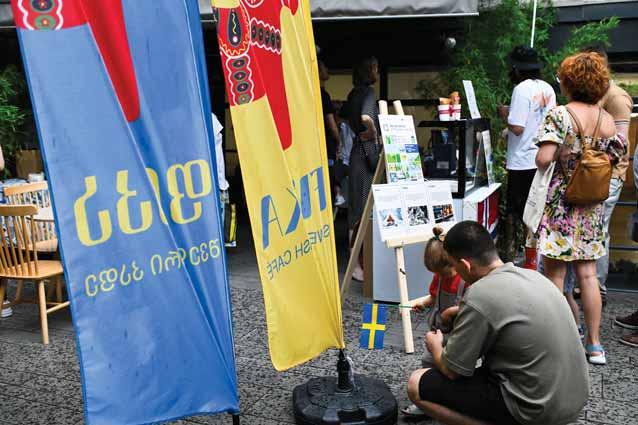
GEORGIA TODAY JUNE 14 - 20, 2024 2 NEWS Continued on page 9
Attendees at Fika, the Swedish café booth at Nordic Days. Photo by Anna Sarkisyan
Prime Minister Irakli Kobakhidze
Tbilisi Mayor Kakha Kaladze
Peter Stano
Ukraine Latest: Ukraine Strikes Russian Missile Systems in Crimea as Kyiv Faces Drone Assault
COMPILED BY ANA DUMBADZE
Ukraine's military hit three Russian surface-to-air missile systems in occupied Crimea overnight, its second reported strike on air defenses on the peninsula this week.
Strikes targeted an S-300 system and two more advanced S-400 systems near Belbek and Sevastopol, Ukraine's general staff said on Thursday.
“As a result of the strikes, two radars of the S-300 and S-400 complexes were destroyed. Information about the third radar is being clarified,” it said on Telegram.
In a report on Monday, Washington DC-based think tank the Institute for the Study of War said Ukraine likely used ATACMS in the attack.
If true, this would be one of the first ATACMS strikes Ukraine has launched against Crimea since the US secretly sent the country about 100 ATACMS in April.
Ukraine has already reportedly used one of the missiles to take out more than 100 Russian soldiers stationed 50 miles from the front line in the occupied Luhansk Oblast, showcasing the missile's range and power.
Philip Karber, a military analyst with expertise on Ukraine, told Radio Free Europe in April that the weapons "could basically make Crimea militarily worthless."
Zelensky is participating in several diplomatic events over the next few days aimed at discussing how to help Ukraine fend off the Russian invasion or how to bring about an end to the war.
Meanwhile, At least nine people have been killed and 29 injured in Russian
airstrikes on Volodymyr Zelensky’s hometown Kryvyi Rih.
The deadly strike came just a day before the leaders of countries that are some of Ukraine’s biggest backers are set to discuss how to slow Moscow’s offensive.
Those killed in Kryvyi Rih include five children, officials said, after Russian missiles hit an apartment block in the town.
UKRAINE TROOPS SAY FIRING
US WEAPONS INTO RUSSIA COULD ‘TURN RUSSIAN LIVES INTO A NIGHTMARE’
Ukrainian colonel says Joe Biden’s decision to partially lift restrictions on using American-supplied weapons inside Russia has already yielded dramatic results in helping halt an advance by Vladimir Putin’s forces around the northeastern region of Kharkiv, and has made Moscow’s troops think twice about a widespread assault on the neighboring area of Sumy.
RUSSIAN FORCES
‘DELIBERATELY STARVED’ UKRAINIANS IN MARIUPOL, NEW REPORT CLAIMS
Russian forces deliberately starved Ukrainians in Mariupol as a tactic of war by targeting their water, food and medical facilities before taking the strategic port city in 2022, based on an investigation by an international human rights group.
Satellite imagery showing evidence of targeted attacks on civilian infrastructure in the city, including food distribution centers, was collected by Global Rights Compliance’s Starvation Mobile Justice Team, and relate to the first 85 days of Russia’s invasion of Ukraine before the fall of Mariupol.
In a report on “Russia’s siege, starva-
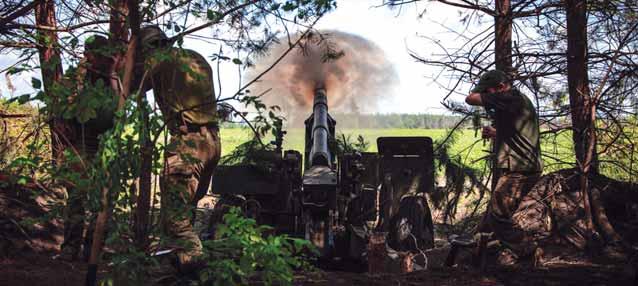
tion, and capture of Mariupol city”, the rights group said its investigators analyzed reams of satellite imagery as well as pictures, videos, public statements and digital data to make the assessment. The investigation took about a year to complete.
Civilians who couldn’t escape “died silent deaths inside Mariupol,” Olha Matskiv, a Ukrainian legal advisor on the Starvation Mobile Justice Team, told The Independent.
BLASTS OVER KYIV AS UKRAINE STOPS MAJOR RUSSIAN MISSILE ATTACK
Russian forces fired missiles and drones at the Kyiv region and five other areas of Ukraine in a nighttime attack, officials said Wednesday, ahead of several days of intense diplomatic activity around the war that is now in its third year. Ukraine’s air force said it shot down
29 out of 30 air targets, including four cruise missiles, one Kinzhal ballistic missile, and 24 Shahed drones. Several people were injured, authorities said. Ukraine President Volodymyr Zelensky praised the air force’s response, calling it a “daily achievement.” He has repeatedly appealed to Ukraine’s Western partners to provide more air defense systems, and the United States has agreed to send another Patriot missile system, two US officials said late Tuesday.
BIDEN HEADS BACK TO EUROPE FOR G7 SUMMIT TO TALK UKRAINE SUPPORT
President Joe Biden headed to Italy on Wednesday for a summit of the world’s leading democracies with an urgency to get big things done, including turning frozen Russian assets into billions of dollars to help Ukraine as it fights off Russian President Vladimir Putin’s
war machine.
Biden and his counterparts from Canada, Britain, France, Germany, Italy and Japan will use the summit to discuss challenges related to the spread of artificial intelligence, migration, the Russian military’s resurgence, and China’s economic might, among other topics. Pope Francis, Ukrainian President Volodymyr Zelensky and Turkish President Recep Tayyip Erdogan are joining the gathering at the Borgo Egnazia resort in the Puglia region of southern Italy. The summit, which opened Thursday, will play out after far-right parties across the continent racked up gains of surprising scale in just-concluded European Union elections. Those victories, coupled with upcoming elections in the United Kingdom, France and the United States, have rattled the global political establishment and added weightiness to this year’s summit.

GEORGIA TODAY JUNE 14 - 20, 2024 3 POLITICS
Image source: The Independent
Exploring Resistance and Repression Through Film: DOCA and CineDoc Launch 'Belarus 2020'
BY IVAN NECHAEV
The Documentary Association Georgia has partnered with CineDoc Georgia to launch a new thematic program called Belarus 2020. Last month, as part of the growing DOCA Film Club, these two institutions jointly developed and implemented a special program titled ‘What Happened in Russia?’ This program aimed to highlight the reasons behind and, more importantly, the consequences of the adoption of the foreign agents law.
Following the protests and their suppression in Tbilisi, these two major associations of Georgian documentary filmmakers and enthusiasts turned their focus to analyzing the protests in Belarus. Initially, it seemed possible to resist authoritarianism peacefully in Belarus, but these efforts were only brief flashes before leading to isolation and more severe repression. The next screening will feature ‘Motherland,’ directed by Alexander Mihalkovich and Hanna Badziaka. Each DOCA Film Club screening includes subtitles in both Georgian and English. The first film in this series was ‘Courage,’ directed by Aliaksei Papuyan. Paluyan's ‘Courage’ is a poignant documentary that delves into the heart of Belarus's struggle for democracy, providing a visceral glimpse into the lives of those who stand up to oppression. Through the lens of three actors from the Belarus Free Theatre in Minsk, the film captures the raw emotions, personal sacrifices, and indomitable spirit of a people yearning for freedom.
THEMES OF RESISTANCE AND IDENTITY
At its core, ‘Courage’ is a narrative of
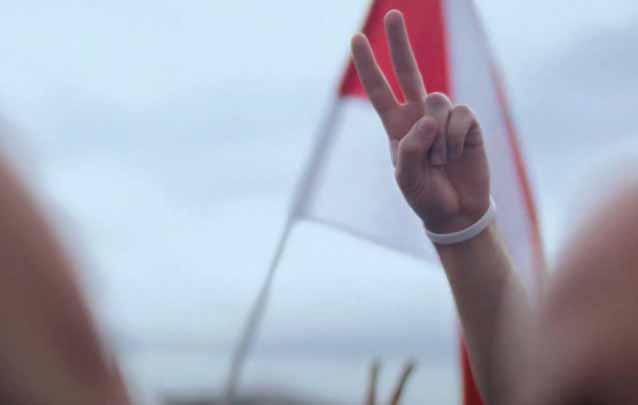
resistance. The title itself encapsulates the essence of the documentary, emphasizing the bravery required to oppose an authoritarian regime. The three protagonists, Maryna Yurevich, Pavel Garadnitski, and Denis Tarasenko, are not just actors; they are symbols of the broader Belarusian resistance. Their involvement in the protests against President Alexander Lukashenko's regime transcends mere political activism: It becomes a quest for identity and self-expression in a country that stifles dissent.
The film explores how art and politics intertwine, with the Belarus Free Thea-
tre serving as a microcosm of the larger societal struggle. The theater, known for its underground and often controversial performances, represents a bastion of free thought and creative resistance. Through their art, the protagonists challenge the status quo, using performance as a form of protest and a means of reclaiming their identity in a repressive environment.
CINEMATIC TECHNIQUES AND NARRATIVE STRUCTURE
Paluyan employs a cinéma vérité style, which enhances the authenticity and immediacy of the documentary. This
approach allows viewers to experience the events as they unfold, creating a sense of immersion and emotional engagement. The handheld camera work, often shaky and intimate, mirrors the instability and chaos of the protests, effectively conveying the tension and danger faced by the participants.
The narrative structure of ‘Courage’ is both linear and episodic, weaving together personal stories with broader political events. This dual focus ensures that the documentary is not merely a political statement but also a deeply human story. By interspersing scenes of the actors' everyday lives with foot-
age of the protests, Paluyan highlights the personal stakes involved in the struggle for freedom. This juxtaposition also underscores the pervasive impact of the political situation on all aspects of life in Belarus.
SOCIOPOLITICAL CONTEXT AND IMPACT
The backdrop of ‘Courage’ is the 2020 Belarusian presidential election, widely regarded as fraudulent, which sparked massive protests across the country. The documentary provides crucial context for understanding the scale and significance of these events. It chronicles the brutal crackdown on protesters, the widespread detentions, and the pervasive atmosphere of fear and repression. However, ‘Courage’ is not just a chronicle of victimhood; it is a testament to resilience and solidarity. The film captures moments of collective action and mutual support among the protesters, illustrating the strength of community in the face of tyranny. This aspect of the documentary is particularly resonant, as it portrays the Belarusian struggle as part of a larger, universal fight for human rights and democracy.
The impact of ‘Courage’ extends beyond its immediate subject matter. By bringing international attention to the situation in Belarus, the film serves as a call to action for the global community. It underscores the importance of solidarity and the need for international support in the fight against dictatorship. In an era marked by the resurgence of authoritarianism worldwide, the film ‘Courage’ emerges as a poignant reminder of the human spirit's resilience and the enduring importance of standing up for one's beliefs. It underscores the idea that, despite the inherent risks, the pursuit of freedom and democracy remains a noble and necessary endeavor.
EU Elections 2024 Results & Consequences
COMPILED BY ANA DUMBADZE
It was a good weekend for the far right across the European Union, and a nightmare for liberals and greens, as residents in 27 countries went to the polls to elect the bloc’s new parliament.
The center-right European People’s Party (EPP) of European Commission President Ursula von der Leyen stood its ground, remaining the strongest group in the European Parliament. But a growing far-right presence at the heart of Europe is expected to shake up policies in Brussels. As Von der Leyen aims for a second term as European Commission president, she will have to deal with a parliament that is less environmentally friendly, more fragmented, and increasingly unwelcoming towards migrants, observers say.
WINNERS
The center-right European People’s Party (EPP) confirmed itself as the 720seat chamber’s biggest bloc, gaining eight more seats compared to the 2019 elections, for a total of 182. The far-right Identity and Democracy (ID), led by France’s Marine Le Pen, won 58 seats, nine more than five years ago.
Nonaligned parties – which include parties from both the right and the left that do not belong to one of the recognized political groups – won 99 seats,
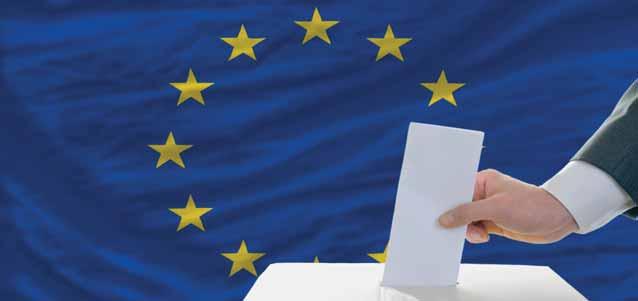
37 more than in 2019.
The European Conservatives and Reformists (ECR), dominated by Italy’s Prime Minister Giorgia Meloni, earned four more seats than five years ago.
LOSERS
The center-left Progressive Alliance of Socialists and Democrats (S&D) lost four seats, but the group remains the second strongest bloc in the parliament with 135 seats. Still, it came second in big countries such as Spain, where it ranked as the first party in 2019.
The liberal Renew Europe (RE) lost 22 seats in a major blow. The Greens party, which made strong
gains in the 2019 elections, also took a major hit by losing 19 seats.
“The wars in Ukraine and in Gaza, along with an ongoing economic crisis across the bloc – all of that contributes to a much more anxious climate, which also makes voters look for more security,” said Vessela Tcherneva, the European Council on Foreign Relations’ deputy director. “And the far right is promising them more security.”
But, Tcherneva noted, EU elections are also referendums on national leaders.
LOSERS AND WINNERS
AMONG NATIONAL LEADERS
German Chancellor Olaf Scholz’s Social
Democratic Party (SPD) suffered a crushing defeat, securing about 14 percent of the vote — coming in third place behind the conservative alliance of the Christian Democratic Union (CDU) and the Christian Social Union (CSU), which secured 30 percent of the vote, and the big gainer, the extreme-right Alternative for Germany (AfD), which scored its best results in history with 16 percent of the vote. The vote triggered a political earthquake in France, where Le Pen won 30 percent of the vote with her National Rally (RN) party – double compared to President Emmanuel Macron’s Renaissance (RE) party. As a result, Macron
dissolved parliament and called for snap elections. The president now has three weeks to convince French voters to back his party.
It wasn’t a great night for Hungary’s nationalist leader Viktor Orban’s Fidesz party. While he got nearly 44 percent of the vote, it was the party’s worst-ever result in an European Parliament election.
Italian Prime Minister Giorgia Meloni was a definite winner, her Brothers of Italy getting nearly 30 percent of the vote. It’s the perfect political backdrop for her, as she prepares to preside over the Group of Seven (G7) leaders summit later this week in Fasano.
WHAT WILL BE CONSEQUENCES?
Despite their overall gains, far-right parties are divided among themselves. For instance, the ID kicked out the German AfD in May after comments from a leader of the party indicating sympathy with the Nazis.
“Cooperating in the name of a superior objective is not really their beloved exercise,” said Olaf Bohnke, Berlin director of the Alliance of Democracies Foundation, a non-profit organization, speaking of far-right parties.
Still, said Bohnke, these far-right groups could slow down or block EU policies – especially those related to climate change, migration and foreign policy, including aid to Ukraine.
SOURCE: AL JAZEERA
GEORGIA TODAY JUNE 14 - 20, 2024 4 POLITICS
Still from the movie trailer
Mark Galeotti on Putin’s Rise and Eventual Fall, and Georgia’s Inescapable Curse
Continued from page 1
“No matter what conspiracy theories might claim, it is very unlikely that he is still alive and sitting on a beach somewhere, but, on the other hand, his shadow is still being cast across Russia. The various dismissals we're seeing within the Russian Defense Ministry are proof that a lot of what Prigozhin was saying was right. He may have been a ghastly human being, but it doesn't mean he was always wrong.
“It was shocking for the Russian elite to see Prigozhin killed. Whatever they thought about him, a deal had been struck. And this is the first time Putin actually broke a deal with an insider. Once you've made a deal, you have to stick to it, and when Putin broke that, something else broke. It may well be that as we see Putin’s increasingly Brezhnevian reign continue, this will be a factor.”
ALEXEI NAVALNY IS ALSO “GONE.” HOW ARE THE FORTUNES OF THE RUSSIAN OPPOSITION LOOKING?
While there's this Russian emigre opposition, they are essentially irrelevant, sad though it is to admit. In terms of within Russia, there is no organized opposition at all. That doesn't mean that everyone is happy. Ironically, this is something that may come back to bite the Putin regime. When you have an organized opposition, it's obviously more dangerous. But then if it also begins to become more powerful, at least you have someone with whom you can negotiate, or, if needs be, to crack down upon.
Now what we have is a lot of generalized dissatisfaction in the country; whether it's because of the war and the fear of mobilization; whether it's because some people are making a lot of money, but a lot of people are actually experiencing hardship; whether it's simply because they’re fed up with the old man who seems there to stay. The risk is that at some point, that will catalyze, and the parallel that I've heard Russians use, including one person from within the security apparatus, is what happened in Poland with the Solidarity Movement. When, a month prior, who'd have thought that some electrician called Lech Wałesa would emerge as the champion?
WHAT ARE THE ODDS OF THAT?
Today or tomorrow? None at all. The point is that, firstly, the current economic improvement the Russian economy is facing is basically because the government is spending a lot of money. And it's using up its own reserves by doing so. A lot of it is blood money, being paid precisely to people who are fighting or to the families of those who have died in their battles. Or it's money that is being spent on the defense industry, attracting workers to the factories. And that's pushing up everyone's wages, and that's good for them in the immediate term, but it's also inflationary. So I think that we are inevitably going to see the economic costs of this war, as well as the human costs, increase.
WILL WE SEE A SUDDEN COLLAPSE OR A GRADUAL DETERIORATION, THAT THEY CAN SOMEHOW PAD, ALONG THE LINE?
Again, to use the parallel with Brezhnev, this is a slow decline toward stagnation. There's no money for research and development or investment; people aren't happy, but not so immediately unhappy. There will be huge crises, and it could be Putin's health; it could be a sudden Ukrainian breakthrough on the front lines, maybe with a counter-offensive
If Putin falls, he will fall catastrophically
next year; it could be some sort of major economic crisis. The problem for me is predicting when the unpredictable is going to happen. I have no idea. It could be in a month's time that Putin doesn't wake up. Or it could be that in two years' time, the economy really starts to take a hit. It's the crises that are going to determine it. And they're so hard to predict.
WHAT ARE WE SEEING WITH THIS GOVERNMENT RESHUFFLE?
It’s the Putin regime digging in for the long-term, and anticipating that essentially it's going to be a war-fighting state for the foreseeable future. Not specifically about Ukraine, but because it now regards itself as being essentially at war with the West. Ukraine is just one battlefield.
If we're looking at the defense ministry, clearly it's about trying to bring greater efficiency- not a grand elimination of corruption, but ensuring less corruption. Because every ruble you save is a ruble that can be spent on the war. It's the whole government structure being made into a war-fighting machine.
The other part of the reshuffle is generational politics. You have a generation of 60-something-year-olds and older, and those 50-something-year-olds, the next political generation, are getting a bit impatient as Putin and his collection of 70-year-olds remain in power. And also, these are kleptocrats who didn't sign up for some grand existential war with the West: They wanted to be able to steal and then enjoy the wealth, which basically means being able to travel and buy spare parts for your BMW and everything else. They want the old days, where you steal at home and bank abroad.
Thanks to the plan of Sergei Kiryenko, first deputy president of the administration, they are starting to cultivate the next generation down, to find the ambitious wannabes and encourage them to be Putinists. Putin loves a divide-andrule, and that’s how he's running the system throughout. So now, instead of horizontal, one faction, one individual against another, it's now going to be vertical. So he can pit the 40-year-olds against the 60-year-olds, shall we say. We're seeing, for example, the distribution of seats, companies, and assets not going to oligarchs, but going to minigarchs. We’re seeing a variety of new figures like Dimitri Patrushev, but a lot of others as well – again, the idea is creating a new generation of people who he can draw on and who he hopes will be loyal. In his mind, if everyone is fighting everyone else, they won't set their sights on the throne of the Tsar.
IS THE WEST TAKING APPROPRIATE MEASURES AGAINST THIS “WARFIGHTING MACHINE”?
The honest answer is no. That's not just because of Western failure, it's because what no one really wants to admit is that the Ukraine conflict is not that important to the West. All the politicians say it's crucial and a way of keeping everyone secure, but no one's behaving as if that's the case. The Russians are spending 6.9% of GDP according to their own figures,
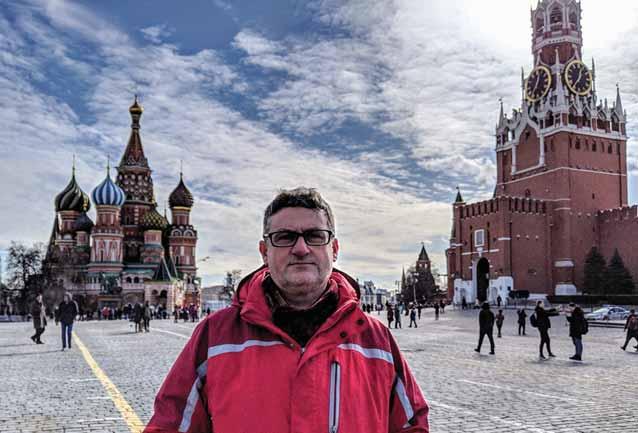
which is certainly an underestimate. In the West, we're still seeing some countries not yet making the 2% GDP defense figure of NATO members. We are not willing to totally reorient our economic and political systems to fight a war that frankly doesn’t pose much of a threat right now. A Ukrainian defeat is no longer seriously thought of as meaning that Russian tanks will be up against the Romanian border. A Ukrainian defeat will mean that the Russians will take part of the country and impose certain political constraints to subordinate the rest. But that's the worst case scenario.
IS THAT PERCEPTION GROUNDED IN TRUTH?
I think so. I think the days when the Russians could actually roll across Ukraine are long gone. And frankly, also, the prospects of the Ukrainians being able to push every single Russian soldier out of every single square centimeter of Ukraine is also fairly hard to imagine. Victory and defeat will be found in the gap between those two cases.
IN AN ARTICLE, YOU TRIED TO PREDICT WHAT RUSSIA WOULD LOOK LIKE IN 2030. YOU SAY UKRAINE WILL BE “DIVIDED” MUCH LIKE KOREA, ALTHOUGH IT COULD STILL AT ANY POINT EXPLODE INTO VIOLENCE.
Yes. I wish it were not so, but I think that seems to be the likely situation. And also because, let's be honest, neither side has the capacity to sustain this kind of tempo of war indefinitely. We’ll see a couple more years in which they can keep it going, but after that point, for economic as well as human reasons, the conflict will not stop, but will be more like two punch-drunk boxers in the ring hanging onto the ropes and occasionally coming out with a flurry of blows.
It's a question of where the lines get drawn and what the shape of Ukraine that emerges is. Because, again, there's a big difference between an impoverished and miserable Ukraine that risks constant attack by Russia, and one brought into NATO or the European Union.
IN THAT SAME ARTICLE, YOU SPEAK ABOUT PUTIN’S POTENTIAL SUCCESSORS AND HOW LIKE KING LEAR HE WILL BE, WHO PIT HIS DAUGHTERS
AGAINST EACH OTHER. HOW LIKELY IS IT THAT HE WILL END UP LIKE KING LEAR IN THE END, FORSAKEN BY ALL?
Wouldn't that be lovely? I suspect that the answer is “not likely,” though. The one thing that this system is good at is maintaining the security of the Tsar and the central system. It’s going to be one extreme or another - If he falls, he will fall catastrophically, which might be like King Lear, but King Lear sitting in The Hague or King Lear fleeing the mob. I think it's much more likely though, alas, that he’ll limp through until death or ill health takes him out of the equation.
WHAT WILL GEORGIA AND MOLDOVA LOOK LIKE IN 2030, GIVEN THE RECENT DEVELOPMENTS?
I'm a Russianist, and I'm uncomfortable even trying to imagine what 2030 will be like for Russia, let alone Georgia or Moldova. Georgia, from an outsider's point of view, is in this constant and interesting tension between a natural inclination towards Russia, because this is a country on the borders that already has all kinds of traction through South Ossetia, Abkhazia, as well as economic and other links, and a philosophical desire to be connected to the West, Western traditions, democracy, the market, etc. And we've seen the pendulum swinging right back in the other direction of late, which I don't think is necessarily a Russian plot: I think it's simply a rich man whose interests align with that, and, therefore, he will do what is good for him.
Russia knows how to deal with rich people, kleptocrats and authoritarians. I ultimately think that it's going to be a transitional thing. I'm not necessarily thinking that there's going to be another Georgian revolution, the Revolution of Dignity, that sort of thing. But I do think that by 2030, the pendulum will swing back. Particularly because, by that point, Russia will still be a player that has all sorts of capacities, but it will be in decline, and too busy to worry too much about Georgia.
YOU’VE WRITTEN ON RUSSIA FOR SO MANY YEARS. I SUSPECT YOU’VE STUDIED YOUR FAIR SHARE OF OLIGARCHS. IF I WERE TO ASK YOU TO PAINT A PORTRAIT
OF IVANISHVILI, WHAT WOULD THAT LOOK LIKE?
It's hard for me not to think of him as a Russian oligarch who just happens to have a Georgian passport. The thing is that Russian oligarchs are kept in check by a fairly powerful state, and other oligarchs are also powerful and ruthless. But then you Ivanishvili, an oligarch who finds himself in an environment in which there isn't a powerful and ruthless state, no one against him. So, he expands to fill the available space. It's actually the very, very familiar characteristics of empire: Self-indulgence, regarding politics as essentially something that you buy and sell, rather than as involving any kind of reflection of the will of the people, and there's nothing much to stop him.
And you asked me about Moldova. What's really fascinating is if you look at the situation in Transnistria at this point, you have the Ukrainians constantly begging the Moldovans, “allow us to invade it, we'll give it back to you, short of all that ammunition sitting in a huge weapons depot there.” And it's the Moldovans who are saying, “please don't make things worse.” But also, you've got the Transnistrian government itself that actually enjoys the current status quo and does not want to see things worsen, because they make a lot of money from how it is. This is a classic area where Russian influence, its capacity to meddle in Moldova, is still high, because Moldova is a weak, impoverished country with very limited structures to defend itself, because how could Russia get to you - you can't reinforce its troops or rearm them or anything without crossing Ukrainian or other airspace. The gravitational power of the EU and the EU's combined economy is such that we are increasingly seeing an environment in which Transnistria is likely to find some kind of home, become a more comfortable member of the Moldovan polity in due course. Especially as the natural turnover of people happens. And Moldova will be increasingly connected to Romania.
SO THE FUTURE IS LOOKING BRIGHTER FOR MOLDOVA. I think it is. Moldova has been geographically blessed in this particular way, in a way that Georgia is arguably geographically cursed.
GEORGIA TODAY JUNE 14 - 20, 2024 5 POLITICS
Mark Galeotti in Red Square, Moscow, 2019. Photo by Mark Galeotti
Georgian Glass Market Participated in WinExpo Georgia 2024
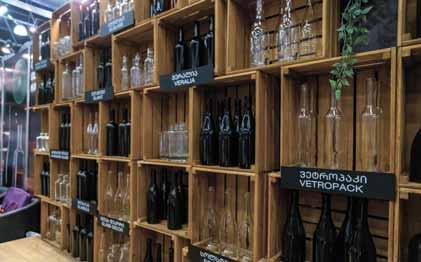 BY MARIAM MTIVLISHVILI
BY MARIAM MTIVLISHVILI
Georgian Glass Market is a Georgian company focused on the production of environmentally friendly glass products. It provides customers with a reliable and comfortable service in its provision of top quality products, made using the best materials and modern technological processes. To find out more, GEORGIA TODAY talked to Tea Gorozia, Georgian Glass Market Marketing Director.
WHAT WAS THE PURPOSE OF CREATING THE GEORGIAN GLASS MARKET?
Georgian Glass Market was founded in
Georgia in 2021, and in the short time since has managed to become the largest importer of glass tar and packaging materials in the market. Our founders decided to create the company based on their accumulated experience in the wine business sector, and knowledge of market challenges and ways to solve them. The company was created to simplify the work of Georgian entrepreneurs and help them in the production of wine, chacha, brandy and soft drinks. We’re a growth-oriented company, and every day we try to increase our range of products and make our services as accessible as possible.
WHAT KIND OF PRODUCTS DO YOU OFFER CUSTOMERS, AND WHAT MAKES YOUR COMPANY STAND OUT?
The company offers its partners glass containers, a full range of materials needed for molding and packaging. The advantages of Georgian Glass Market are the best price in the market, fast delivery service, and a flexible payment schedule.
We are also focused on quickly and comfortably providing Georgian manufacturers with glass tar and the materials necessary for molding, so that the manufacturer has the opportunity to concentrate as much as possible on the main task – to create and develop the product.
YOUR COMPANY PARTICIPATED IN WINEXPO GEORGIA 2024. TELL US ABOUT IT.
On June 7-9, Georgian Glass Market was represented at the 16th International Exhibition of Wine and Spirits, where we presented the full range of glass tar and packaging materials of Georgian Glass Market.
This exhibition was important, because the existing and new customers got to discover our products in detail, and within the framework of the expo event, the company gained the interest of many manufacturers.
TELL US ABOUT YOUR FUTURE PLANS.
We will continue to grow the company and cooperate with more partners and meet their requirements as much as possible. Accordingly, we think that very soon we will be the first in the Georgian market in the direction of glass tar import.

WinExpo Experts Claim Georgian Wines Have Increased in Quality
BY SHELBI R. ANKIEWICZ
The quality of Georgian wines has increased substantially this year, said the jury of wine experts that rated numerous varieties at this year’s WinExpo.
WinExpo, organized by ExpoGeorgia, and running for its 16th year, seeks to connect Georgian winemakers with others in their field, producers of new wine technologies, the public, and those in the related business world. Each year, world-class experts are invited to assess the quality of Georgian wine in the Georgia International Wine Awards which has been ongoing for 14 years as a part of WinExpo. CEO of ExpoGeorgia, Resan Kikava, said the competition is a good incentive for winemakers to participate, witness sectoral improvements, and to work towards getting Georgian wine to the level it deserves.
“It was an exceptional year in terms of the quality of wine and the number of wines presented,” said Kikava. “It’s more or less the same every year, between 200 and 250 [winemakers], but the quality has increased, and that’s the biggest success.”
Of the wineries that participated in the awards, Kikava said over 100 of them won silver medals, 40 got gold medals, and six received trophies. Any vineyard that participates in the festival can also opt to participate in the awards. Kikava explains that it’s difficult to go before a jury with homemade wine and watch an expert critique it, and he applauds those who do it.
Tim Atkin, a Master of Wine and chairman of the jury from the United Kingdom, always leads the jury. Kikava said the awards follow his methodology of how wine should be chosen. Everyone who participates in the jury must be familiar with Georgian wine, understand the qvevri winemaking process, the numerous grape varieties throughout
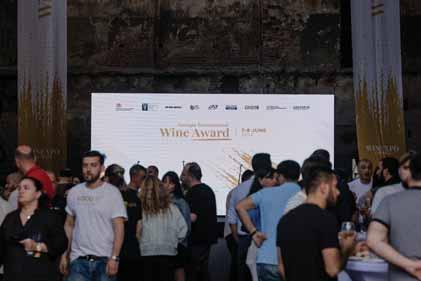
the region, and recognize how Georgian wine differs from European wine. For this reason, it is vital to have Georgian participants on the jury who can discuss their experiences and opinions.
Any winery can participate in WinExpo, and there is a special space dedicated to smaller or family-owned businesses.
Kikava said ExpoGeorgia shows its support for smaller vineyards and the sector's development by allowing them to participate in the event free of charge.
Liza Jgenti, the designer for Winery 12 Qvevri, a family-owned business, said it was their first year participating in a wine festival, and said it has been a great opportunity for them to expand into the field.
“It’s really important for marketing and for people to get to know you. After the festival, you’re invited to events by bigger organizations when they are doing stuff with wineries,” said Jgenti. “I love communication between people who love wine. We exchange information with our fellow businesspeople. We enjoy meeting people who love wine and giving them the chance to taste our product.”
Each year, WinExpo presents new wines and demonstrates the quality, success,
and struggles winemakers endure in the industry. In addition to the wine tasting, there was a panel discussion comprised of exporters from around the world, among them representatives from Holland, Japan, and the UK, who presented their opinions about Georgian wine's potential, and struggles in the local markets. Through such events, winemakers can learn how to address the problems and better adapt to the market.
According to Kikava, it can be difficult to integrate and export to foreign mar-
kets, since most Georgian winemakers have limited resources. Due to this, WinExpo also had a section dedicated to businesses and technology in the world of wine, including bottling, labeling, and products from different countries. This lets participants see different products and gain insights into new methods and tools they could adopt.
There are many supporters of the event, Kikava told GEORGIA TODAY, including the Ministry of Agriculture in Georgia and the Georgian National Wine Agency. He said these groups encourage winemakers to explore new markets and participate in exhibitions in Georgia and internationally.
Kikava said there is one critical step to selling wine in an international market: “It’s important to sell Georgia as an interesting country first, because when people are considering buying French wine, they look at France; the same with Italian wine, Chilean, or Australian wine - first they think about the country to understand where the wine comes from,” said Kikava. “You need to start with the fact that Georgia is the oldest winemaking country, with 8000 years of history making it!”
It is only in the last 20 years that Georgia’s wine market has started to grow. During Soviet times, wine could not be called ‘Georgian wine’. When Georgia
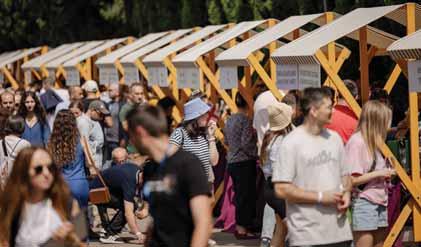
became an independent state, winemakers started labeling and creating their own wine; however, these were primarily for the Russian market, and much of the wine was not bought because of its quality.
In 2006, the Russian political embargo on Georgian wine is what caused the quality of wines to subsequently increase and exports to Europe to begin, as wine producers sought new market destinations for their products. Kikava explained that the challenge now, since the Russian market has reopened, is keeping the quality of wines high so exports to Europe can continue, just in case Russia shuts its doors to Georgian winemakers again. Kikava told us he’s glad to see Georgian winemakers on the right path, focusing on the quality of their wine rather than the quantity.
“Wine is important because it’s not only about the product, but about the huge legacy that comes with it,” Kikava stated. “Just thinking about having the genes of the same people who were making wine here, on this land, 8000 years ago, makes me feel special. I believe it should make every Georgian feel special.”
The jurors of the event were: Tim Atkin (Master of Wine and Head of Jury – UK), Beth Willard (Wine Writer – Australia), Kenichi Ohashi (Wine and Japanese Sake Expert – Japan), Cong Cong Bo (Sommelier – UK), Chan Jun Park (Wine Writer and Educator – South Korea), Ana Martin Onzain (Oenologist - Spain), Levan Mekhuzla (Oenologist - Georgia), Mikheil Meskhi (Oenologist - Georgia), Anna Godabrelidze (Oenologist - Georgia), Giorgi Dakishvili (Chief Oenologist - Georgia).
ExpoGeorgia is a convention center in Tbilisi that organizes large industrial events. They create their events from scratch and manage them with the help of partners. Kikava said he is thankful to everyone who worked at ExpoGeorgia for establishing WinExpo. Specifics about the winners can be found on the WinExpo Facebook page.
GEORGIA TODAY JUNE 14 - 20, 2024 6 BUSINESS
Balancing Transparency and Growth: Assessing Georgia’s Foreign Agent Law and Its Impact on the Startup Ecosystem
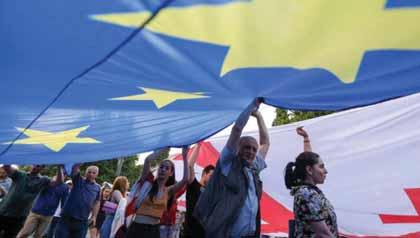
Georgia’s proposed foreign agent law, while primarily targeting NGOs and media outlets, has ignited significant political debate. Though it does not directly impact commercial companies, the interconnected nature of politics, the economy, innovation, and entrepreneurship means that its effects could reverberate through the startup ecosystem. To understand the potential implications, it is crucial to first appreciate the current strengths and attractiveness of Georgia’s startup landscape.
THE CURRENT STATE OF GEORGIA’S STARTUP ECOSYSTEM
Georgia has rapidly emerged as a promising hub for startups, characterized by several key factors that make it an appealing destination for entrepreneurs and investors alike.
1. Government Support and Policy Initiatives - The Georgian government has been a proactive catalyst in fostering a conducive environment for innovation and entrepreneurship. Through targeted policy initiatives and support programs, such as "Startup Georgia," the government provides essential funding and resources to nascent ventures. These initiatives are designed to ignite entrepreneurial activity and support the sustainable growth of startups across the nation. Reflecting its commitment to a business-friendly environment, Georgia consistently ranks high in the World Bank’s Ease of Doing Business index.
2. Investment and Partnerships - The global investment community has increasingly turned its attention to Georgia’s vibrant startup scene. Esteemed organizations such as 500 Global and Accel have made notable investments in Georgian startups, bringing not only financial capital but also invaluable mentorship and expansive global networks. These partnerships enable Georgian startups to access international markets and expertise, significantly enhancing their growth and scalability prospects.
3. Tax Incentives and Ease of Doing Business - Georgia’s startup ecosystem benefits from a highly favorable tax regime. The government offers substantial tax incentives for tech and IT companies, considerably easing the financial pressures on startups. Furthermore, the process of registering a company in Georgia is remarkably efficient, often completed within a single day. This streamlined regulatory framework lowers barriers to entry, encouraging more entrepreneurs to establish and grow their ventures locally.
4. Entrepreneurial Culture and Community - The country boasts a dynamic entrepreneurial culture, underpinned by a burgeoning network of co-working
spaces, startup events, and networking opportunities. High-profile events like Startup Grind in Tbilisi have positioned Georgia as a burgeoning tech hub, attracting entrepreneurs, investors, and innovators globally. This vibrant community fosters a collaborative spirit and drives innovation, essential ingredients for a thriving startup ecosystem.
POLITICAL STABILITY AND INTERNATIONAL PERCEPTION: CRITICAL FACTORS FOR GEORGIA'S
STARTUP ECOSYSTEM
Political stability and government transparency are crucial determinants of foreign direct investment (FDI) and the overall business landscape. For Georgia, a country with a population of approximately 3.7 million, these factors are particularly significant in shaping its startup ecosystem and economic growth.
IMPORTANCE OF POLITICAL STABILITY AND TRANSPARENCY
Political stability and a transparent government foster a predictable and secure environment for investors. These conditions are essential for attracting FDI, which plays a pivotal role in providing the capital needed for startups to scale and innovate. When investors have confidence in the stability and transparency of a country's political environment, they are more likely to commit resources, knowing that their investments are secure and that the regulatory framework is reliable.
IMPACT
ON FOREIGN DIRECT INVESTMENT
Georgia’s political landscape directly influences its attractiveness to foreign investors. Stability and clear governance mechanisms are key to ensuring sustained investment flows. Conversely, political instability or perceptions of government opacity can deter investment, leading to capital flight and reduced economic opportunities. The introduction of the foreign agent law has sparked concerns about Georgia’s political direction, potentially impacting its ability to attract and retain foreign investment.
VIABILITY OF STARTUPS AND INTERNATIONAL MARKETS
For Georgian startups, access to international markets and capital is vital. The small domestic market limits the growth potential of startups, making international expansion essential for scaling operations. Startups rely on foreign investment, partnerships, and sales in international markets to achieve significant growth and sustainability. Without this international dimension, the scalability of Georgian startups would be severely constrained.
THE ROLE OF INTERNATIONAL PERCEPTION
International perception is critically important for Georgia’s integration into
the global economy. The proposed foreign agent law poses challenges to Georgia's alignment with European Union (EU) standards. Integration with the EU offers numerous economic benefits, including access to a larger market, increased investment, and the free movement of goods and services. These advantages are particularly beneficial for startups, providing them with the necessary resources and market access to grow and compete globally.
EU INTEGRATION AND ECONOMIC BENEFITS
EU membership or close alignment with the EU can significantly boost Georgia’s startup ecosystem. It would facilitate greater access to capital, technology, and expertise from EU member states. Additionally, being part of the EU market would open up vast opportunities for Georgian startups to expand their operations, increase sales, and form strategic partnerships across Europe. This integration could also enhance the credibility and attractiveness of Georgian startups to international investors, further driving economic growth.
POTENTIAL STAGNATION WITHOUT EU INTEGRATION
Without integration into the EU, the potential benefits for Georgia’s startup ecosystem may not be fully realized. The foreign agent law could hinder Georgia’s EU aspirations, thereby limiting the economic advantages that come with such integration. A startup ecosystem that lacks access to international markets and capital is likely to stagnate, unable to attract the necessary investment or achieve significant market expansion.
The political and economic landscape in Georgia is at a critical juncture. The proposed foreign agent law, while aimed at increasing transparency, raises important questions about its impact on the startup ecosystem and the broader economy.
IS THIS A NOVEL LAW?
The concept of foreign agent laws is not new. Similar legislation exists in several countries around the world, including the United States, India, Hungary, and Russia.
GLOBAL COMPARISONS OF FOREIGN AGENT LAWS
1. United States: Foreign Agents Registration Act (FARA)
Enacted: 1938
Key Provisions: Requires individuals and organizations acting as agents of foreign principals to register with the Department of Justice. It mandates detailed disclosure of activities, financial transactions, and relationships with foreign entities.
Purpose: Ensures transparency in lobbying and political activities conducted on behalf of foreign interests.
Comparative Analysis
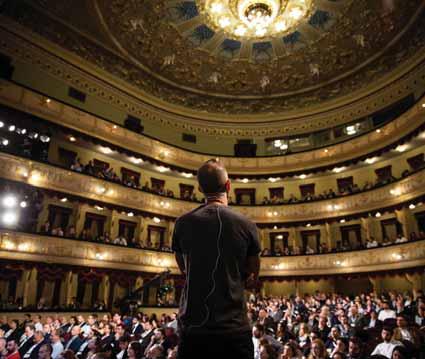
2. India: Foreign Contribution Regulation Act (FCRA)
Enacted: 1976 (amended in 2010 and 2020)
Key Provisions: Regulates the acceptance and use of foreign contributions by individuals, associations, and companies. Organizations must register with the Ministry of Home Affairs and adhere to strict reporting and accounting rules.
Purpose: Aims to prevent foreign influence on domestic political and social activities.
3. Hungary: Transparency Law
Enacted: 2017
Key Provisions: NGOs receiving more than 24,000 euros annually from foreign sources must register and label themselves as foreign-funded organizations. They must disclose their funding sources and report annually.
Purpose: Claimed to enhance transparency and protect national sovereignty, although it has been criticized for stifling civil society.
4. Russia: Foreign Agent Law
Enacted: 2012
Key Provisions: NGOs receiving foreign funding and engaging in political activities must register as foreign agents and undergo rigorous financial audits and reporting. They must label all publications with the "foreign agent" designation.
Purpose: Intended to control foreign influence and suppress dissent, often used to target government critics.
IMPLICATIONS FOR GEORGIA - TRANSPARENCY VS. SOVEREIGNTY
While the proposed law aims to enhance transparency and protect national sovereignty, its implications for Georgia’s startup ecosystem are multifaceted. On
CountryKey ProvisionsSimilarities to Georgia’s Law Differences from Georgia’s Law
USARegistration for political activities, detailed disclosures
IndiaRegistration, strict reporting, limited administrative expenses
HungaryRegistration for NGOs with significant foreign funding, annual reporting
RussiaRegistration for NGOs with foreign funding, rigorous audits
Focus on transparency in political lobbying Does not target NGOs or media specifically
Emphasis on foreign funding transparency Broader scope, impacts a wider range of organizations
Focus on NGO funding transparency Specific to NGOs, less impact on media
High level of control over foreign-funded entities
More stringent enforcement, broader definition of political activities
one hand, promoting transparency in funding sources is a positive step toward reducing corruption and ensuring accountability. On the other hand, the law's similarities to Russian regulations raise concerns about government overreach and potential suppression of dissent.
ECONOMIC AND INNOVATION CONCERNS
For the startup ecosystem, the critical issue lies in the law’s potential impact on international perception and investor confidence. Georgia's aspirations to integrate with the European Union (EU) are central to its economic strategy. EU membership would offer startups access to a vast market, increased investment, and free movement of goods and services. This integration is crucial for startups to scale and compete globally.
STIFLING GROWTH POTENTIAL
If the foreign agent law is perceived as a step toward authoritarianism, it could deter foreign investors and limit the economic benefits of EU integration. Without access to international markets and capital, Georgian startups may face stagnation, unable to attract necessary investment or achieve significant market expansion. The law could inadvertently create an environment of uncertainty, hindering the vibrant growth that has characterized Georgia’s startup scene.
CORRUPTION AND GOVERNANCE
Georgia has a history of corruption, and the government has been working towards greater transparency and anti-corruption measures. A more transparent government is essential for EU membership and for fostering an environment conducive to business growth. However, the foreign agent law’s association with Russia’s restrictive policies could undermine these efforts, creating an atmosphere of mistrust and skepticism.
While the proposed foreign agent law is not novel and exists in various forms worldwide, its introduction in Georgia raises critical questions about the country’s political and economic trajectory. The law’s potential to hinder EU integration, stifle international investment, and create a perception of increased government control could have farreaching implications for Georgia’s startup ecosystem. Ensuring political stability and fostering a transparent, open business environment are essential for sustaining the growth and innovation that have become hallmarks of Georgia’s entrepreneurial landscape.
GEORGIA TODAY JUNE 14 - 20, 2024 7 BUSINESS
A Startup Grind event in Tbilisi. Source: Startup Grind Georgia
Protesters against the foreign agent law in 2023. Source: bm.ge ANALYSIS BY STARTUP-HUNTER
FUTURELAB - Georgian Teams with Innovative Startup Ideas for the US Market to Be Funded and Supported
BY MARIAM MTIVLISHVILI
Aunique opportunity is on offer for innovative Georgian startups to create a technological product or service for the US market and receive
significant support and funding for it. The project is being implemented by the Georgian venture fund and accelerator
FUTURELAB, founded by Irakli Kashibadze. In 2014, Kashibadze initiated the creation of the Georgian Innovation and Technology Agency (GITA), and also launched the GITA grant program for startups, with the involvement of Silicon Valley specialists.
In its latest project, FUTURELAB, with partners in the private sector, will help 50 Georgian teams to test innovative startup ideas for the US market and to make an initial prototype. The venture fund and
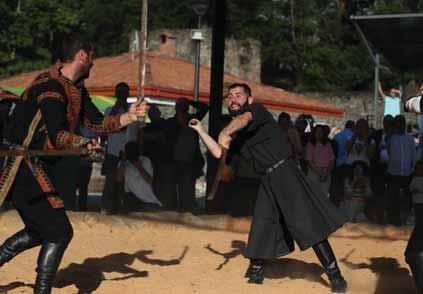 BY NUGZAR B. RUHADZE
BY NUGZAR B. RUHADZE
Traditionalism means a lot to the average Georgian, and we are more than happy that a considerable number of people in the world want to follow the old traditions like we do in this country, - said the master of ceremonies of Ethno-Georgia-2024, a festival that was funded and organized by the association Tsinapari (“ancestor”)
and its founder Giorgi (Ghia) Shiukashvili, which took place last Saturday in the beautiful village of Shilda of the Kakheti region. The interesting get-together was dedicated to the unique demonstration of martial arts of various nations of the world. There were teams from Italy, Japan, Kazakhstan, Norway, Spain, Turkey, and of course Sakartvelo. Each of them presented their own national imagery and feints, masterfully depicting the ancient models of bout. The Georgian team, for instance, demon-
accelerator www.futurelab.ge will allocate 10,000 GEL to each team for this process if selected.
In addition to funding, teams will have the chance to participate in a three-month acceleration program with specialists from Silicon Valley, UC Berkeley, Stanford/ StartX, and others.
In addition to funding and an educational program, teams will gain access to regional and global venture funds, industry partners, and research resources.
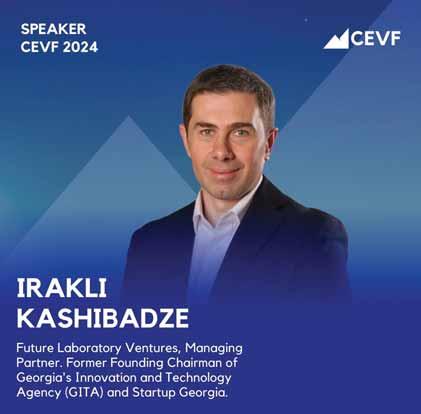
Ethno-Georgia-2024
strated two shows: Kartuli Chidaoba (Georgian Wrestling) and Khridoli (an ancient Georgian technique of combat and defense), perfectly prepared by the president of the Georgian Martial Arts Federation, Nukri Javakhishvili. It rained cats and dogs the entire day, and the mood for the festival started out quite blue. The hundreds of invited spectators and participants managed to shelter themselves, though, eating and drinking the time away. Yet, the powers up there wanted the festival to go ahead, and so it did. The ceremony was opened by the world-renowned opera singer Tamar Iveri, whose vocal recital of the Hymn literally reached the skies to let the world know that Georgians are marching in good will and faith. Then the participating ethnic teams were solemnly asked to the well-equipped stage of the festival by the master of ceremonies, dressed in an eye-catching snow-white chokha (myself, Nugzar B. Ruhadze). The sponsor and organizer of the festival Ghia Shiukashvili was excellently supported by Irakli Soselia and his family, who are currently living in Italy, doing a wonderful service to their motherland from there. It was him who brought Italians, Spaniards and Norwegians to EthnoGeorgia-2024. In each case, before every
Roads, Forwards and Back
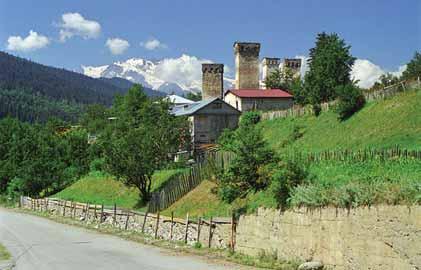
BLOG
Having been away from snow-clear roads in Svaneti for half a year or so, it has been educational (now that they ARE clear of snow) to see how things have fared this past winter. Especially because this autumn, Georgia will have an election of vital importance… and more things tend to get done before such occasions.
I returned to our mountain village
house near Mestia over a month ago, which gave me that good chance at road observation. Other things, too, caught my eye. In February, when I last traveled up, I had never seen the Enguri dam lake as empty as it was then: Most of it was lake bottom. Now, it’s filling up nicely and once again resembles a lake rather than a leak.
The road… there are some newly asphalted sections, and some repairs done, to be sure. But there are also several long new sections where half of the road width, the half at the edge downwards, has dropped off and been lost. These sections
are in need of urgent work, and are getting it. But a few such places, now years old, have been left as they are.
This is a road under constant bombardment from both rockfalls and avalanches. There were never any illusions that stopping those from happening would be possible. It’s the repair that is urgent. Also, the surface of the cemented sections itself is being worn away from the extremes between freeze and thaw in winter; this can be restored, but it’s a big job. Then there is frost heave, which pushes up and even cracks road sections from underneath, also ripe for repair.
It has been a great pleasure to see, over the years, the concrete-and-rebar basic road being extended from Mestia towards Ushguli, and preparation work for the latter down towards Lentekhi, Lower Svaneti’s capital town. Now the only bit left to do from the Mestia direction is the last 4 km or so before Ushguli, and there is active work on this.
The road after Ushguli goes to 2800m or so at its highest, and this has traditionally been allowed to close every winter by high snowfalls. Once it’s all cemented, it’s not clear if there will be plans or attempts to start keeping it open all winter; which would transform life in Ushguli. Rumors of a long tunnel from somewhere to somewhere else, making a much shorter journey from east Georgia to Ushguli and Mestia instead of only
show of combat, a presentation of historical relations between Georgia and the visiting nations was made for the attentive public.
Among the participating speakers were First Deputy Chairman of the Georgian Parliament, Giorgi Volski; First Deputy Minister of Culture of Georgia, Ioseb Bagaturia; Honorary Consul of Kazakhstan in Georgia, Irakli Kakaladze; renowned professional sumo wrestler Tochinoshin Tsuyoshi, alias Levan Gorgadze. From behind the scenes, the festival was inspired and encouraged by the President of the International Federation of Georgian Wrestling, Temur Khubuluri, a twofold world champion in judo and the Olympic prize winner, dexterously assisted by the ubiquitous Tamaz Robakidze. All of them emphasized the importance of traditionalism, ethnic customs and the exchange of cultural values between nations in the modern technologically accelerated world, thus bringing to memory and learning much about the way of life of our ancestors, without whose one-time effort, our civilization could not have lasted. This is exactly what the ethno-festival was devoted to, elegantly justifying every spent cent and second, every drop of sweat, used on turning that lovely event
into a real success.
The crown of the richly loaded day was the concert that followed right after the martial-art performances. The air was filled with the divine sounds of Georgian folk singing by the famous Rustavi ensemble and the group of local polyphonic artistry, named Shilda. The celebrated Sukhishvili National Academy of Dance, presented by young children, demonstrated outstanding artistic skill, building a real choreographic fire on the stage. Then came a mix of modern pop and folk solo vocal numbers which was culminated by a breathtaking song about Sakartvelo by renowned Georgian musician, composer and vocalist Tamara Gverdtsiteli, leaving the audience with enhanced heartbeat and genuine goosebumps.
Certainly, the entire show needed to be preorganized and staged, masterfully realized by Otar Chachanidze and Manana Bakradze, the couple who lead the whole thing with amazing calm, love and professionalism, which was a real delight for Ghia Shiukashvili, whose efforts to promote Kartuli Chidaoba, Kartuli Khridoli and Kartuli ethnic culture goes beyond the boundaries of this country to let the world know better what our Sakartvelo is all about.
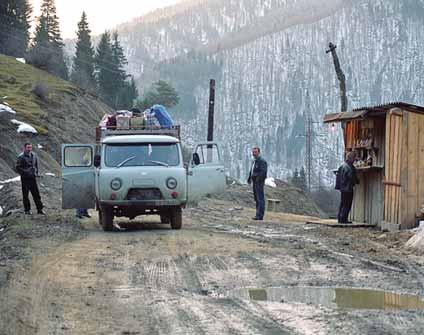
via Zugdidi, are waiting for funds, I’m told. So, steps forward and back, both. Repairs and ignorings. As the tourism season from late spring through autumn gets under way here, it will be interesting to see what gets completed and what will be left. There must be a certain amount of triage, as it can’t all be done, maybe ever. But one can hope. Especially one who is a frequent driver or passenger on these roads, on which we all rely so much. I do remember 6-hour journeys from Zugdidi to Etseri on dirt and gravel roads, before the Rose Revolution, com-
plete with bandits to spice up that long journey. Most of the road can be undertaken by light vehicle, today, not even a 4x4. This, too, is progress.
Tony Hanmer has lived in Georgia since 1999, in Svaneti since 2007, and been a weekly writer and photographer for GT since early 2011. He runs the “Svaneti Renaissance” Facebook group, now with over 2000 members, at www.facebook.com/groups/ SvanetiRenaissance/ He and his wife also run their own guest house in Etseri: www.facebook.com/hanmer.house.svaneti
GEORGIA TODAY JUNE 14 - 20, 2024 8 BUSINESS
SOCIETY
BY TONY HANMER
"I Tidy Up Georgia" - Fourth Stage of the Clean-up Series
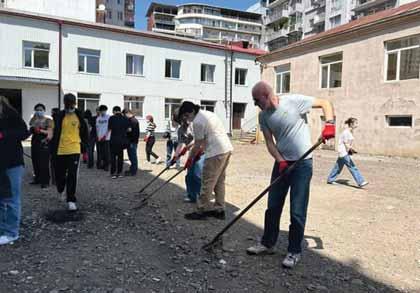 BY THE SADAGI TEAM
BY THE SADAGI TEAM
The fourth stage of the environmental clean-up series, with the participation of schoolchildren and teachers, took place on May 10-15. The event was organized by Sadagi, the Georgia Cleaners’ Guild, an environmental charity. The program is supported by the USAID Georgia Civic Education Program, along with their partner schools.
In this stage, 48 schools from Guria, Samegrelo, Svaneti and Racha-Lechkhumi participated, involving a total of 965 pupils. In total, combining all four stages, the project has seen the participation of over 7000 pupils and teachers, of which 6635 were pupils.
A memorable event took place at Chokhatauri First Public School. Despite May 10 being a holiday, four teachers and 62 pupils, led by Tamuna Megrelidze, teacher of Civic Education, gathered to
clean up their town. Pupils from The Netherlands, Kenya Strang and Ramsay Strang, also joined the local students in cleaning-up the streets of Chokhatauri.
The children had a picnic after the cleanup, enjoyed freshly picked mulberries, and engaged in lively conversations.
This was not the first such civic activity for the Chokhatauri pupils. With the support of their committed teacher Tamuna Megrelidze, and the teaching staff, the students have successfully established self-governance, and regularly engage in civic activities to maintain their environment.
On May 15 and 16, the Sadagi team visited two more schools in Guria. Although bad weather on the day prevented the planned clean-up activities, a productive meeting was held with pupils of Tskhemlishkhidi Public School in Ozurgeti municipality, where they discussed environmental issues and showcased the trees they had planted and grown.
On May 16, the team visited Laituri School in Ozurgeti municipality, wel-
comed by teacher Tsatsa Kviloria. Instead of the 30 expected pupils, the entire school came to take part in the clean-up! The villagers were overjoyed to see the children, wearing clean-up stickers, making Laituri more beautiful.
The Jvari First Public School in Tsalenjikha municipality takes pride in running several clubs, including an Ecoclub led by Saba Patsatsia, who stands out for his patriotism and volunteer activities, and civic education teacher Nana Gogokhia. The school also boasts an Ideathec featuring useful books and modern literature. It displays numerous student achievements in academic subjects and sports, fostering a sense of camaraderie, and striving for results among pupils. The Ecoclub members had painted a large trash can, positioned in front of the school, with Marvel characters. Both the Ecoclub members and Sadagi team believe that those who pick up waste can become superheroes.
We express our heartfelt gratitude to our supporters, including the Georgia Lawyers Association, which administered the grant from GIZ for this stage. Many thanks also to the USAID Civic Education Program, the primary partner of the "I Tidy Up Georgia" project. This initiative began with the joint efforts of the Teacher's National Award team and numerous dedicated teachers and Sadagi members.
We would also like to express gratitude to GIZ, Germany, a major supporter of international cooperation for sustainable development and international education, and the Georgian Young Lawyers’ Association for funding the third stage of the cleanup. Our appreciation extends to the sponsors of "I Tidy Up Georgia". Platinum supporters are Procredit Bank Georgia and Diplomat-Georgia. Silver sponsors are Nikora, Financial Bureau, and Elite Electronics. Media support comes from Palitra L and Georgia Today.

Luca Polare Opened 3 More Branches in Baku!
TRANSLATED BY MARIAM MTIVLISHVILI
Luca Polare opened three additional branches in Baku last week, marking it up to five total branches in Azerbaijan!
The brand went beyond Georgia in the summer of 2023 and opened production in Baku and the first branch in August.
At the beginning of this year, a branch with a different concept was added, and last week three new branches were inaugurated.
"We continue to develop in Baku,” Tinatin Gobejishvili, director of the company, tells us. “Last week, we opened several branches of different formats, including one in a newly opened shopping mall, one on the central street, and
you will find a branch at Seabreeze Beach Resort of Baku.
“We are not stopping development in Baku, and at the same time we are starting to work on a new country and soon we will announce concrete plans!"
The branches and production in Azerbaijan are fully managed by Georgian management, although the service, production and logistics departments have been staffed with local personnel, and the number of employees is increasing with each new facility.
***
Luca Polare is a cafe-ice cream chain that offers customers about 100 types of ice cream and exclusive coffee. The brand has been operating for 15 years and is currently represented in 5 cities across Georgia: 16 branches in Tbilisi, 5 in Batumi, 1 in Kobuleti, 1 in Kutaisi, 1 in Rustavi, and 5 branches in Baku in Azerbaijan.
Nordic Days: Sharing Nordic Culture and Democratic Practices with Georgia
One of the more popular events was a panel discussion about corporate sustainability with representatives from Nordic companies operating in Georgia. They spoke about their experiences, what they do in the country, and the sustainability projects they are currently working on.
Sarkisyan said they implemented culturally entertaining elements as well such as performances by the Danther Jazz Trio, a Georgian-Danish jazz band, and the ‘Nordic Corner,’ where attendees could learn about the concept of leisure by seeing how people in these countries prefer to spend their time with loved
ones. Each day wrapped up with Danish movies that were presented in correlation with the Danish Cultural Institute that recently opened in Georgia. Also, to align even more with principals from these countries, there was a coffee hour meet-and-greet where guests could engage in conversation with the Nordic ambassadors.
“Everybody who has a question, who wants to approach the ambassadors, can go and talk to them. This is also a Nordic value, that people are very open and want to share,” Sarkisyan told us.
Although several things create a country's culture, one of the major elements is its cuisine. Anna Kikabidze owns a Swedish café, Fika, in Tbilisi, which
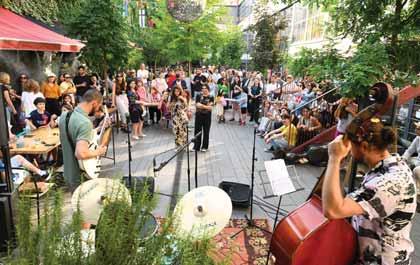
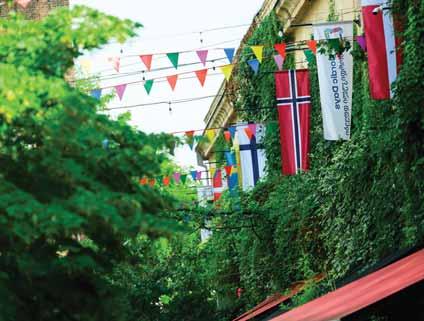
opened in December 2023. She is half Kazak, half Georgian, but grew up in Sweden after her parents fled Georgia in the 1990s in search of a country with a democratic society. After living in different countries over the last eight years, she moved back to where she was born, Tbilisi.
“I always said to myself, I was born in Georgia, and I want to die in Georgia,” said Kikabidze. “I always planned on buying a house here when I was a pensioner, but then I thought, why not go earlier?”
Upon her arrival in Georgia, she real-
ized there weren’t any Swedish or Scandinavian businesses, not even the popular retail company, Ikea. She saw this as an opportunity and jumped on it, opening her café 19 days after she received the keys to the building.
“As a foreigner, I don’t speak Georgian, unfortunately, and I have not been involved in the culture here because I grew up as a Swede,” Kikabidze explained.
“So, I thought, what can I contribute to Georgia, and for me the richest thing I have is being a Swedish person, bringing the culture of Sweden, the values, and the cuisine.”
One thing that Nordic countries are known for is sustainability. Kikabidze said her café is working on implementing more practices, but one that they currently do is reuse leftover food. Each morning, they bake cinnamon buns, a staple dessert in Sweden, and the ones left over the following day are turned into crackers. This prevents food waste, while also ensuring there are fresh products daily.
Kikadze said that being a part of Nordic Days allowed her to introduce a piece of Europe and Sweden to the Georgian public. Since she is one of the few Swedish businesses in Tbilisi, she works closely with the embassy and participates in as many events as possible to showcase her culture. She said she’s glad to see Georgia taking small strides toward sustainable practices such as recycling, since it’s a traditional concept in Nordic countries. Norway and Sweden have established embassies in Tbilisi, and Denmark recently opened theirs covering Georgia and Armenia. Finland, however, doesn’t have one, but the Ambassador of Finland, Kirsti Narinen, also participated in the event, highlighting its importance.
“Cooperation leads to greater benefits than any country can obtain individually. Our shared values have made the Nordic countries among the most prosperous, free, and happiest countries in the world. Now we are sharing our experience with Georgia,” Narinen wrote in a press release. Moving forward, Sarkisyan hopes the event will continue every year, and expand to other countries in the South Caucasus.
GEORGIA TODAY JUNE 14 - 20, 2024 9 SOCIETY
Continued
from page 1
The first-ever Nordic Days at Fabrika in Tbilisi. Photo by Anna Sarkisyan
Georgian-Danish jazz band, Danther Jazz Trio, performing at Nordic Days. Photo by Anna Sarkisyan
The Legacy of Alexander Toradze: 10-Hour Epic Rachmaninoff Marathon Opens Toradze Festival
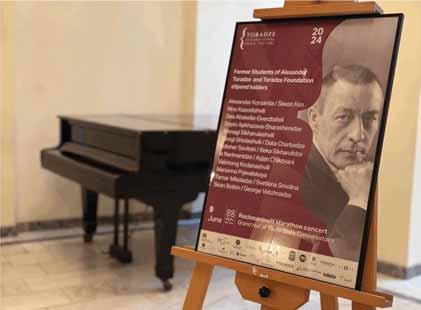 BY IVAN NECHAEV
BY IVAN NECHAEV
The Toradze International Music Festival is being held in Tbilisi for the second time. The program features performances by renowned musicians from the global classical scene, ranging from legendary figures to emerging experimentalists. Notable participants include Gergely Madaras, Paavo Järvi, Christian Blackshaw, Elisabeth Leonskaja, Gabriel Prokofiev, Noemi Gyori, and Matthew Meadows.
This year, the festival opened with a truly grandiose and meticulously curated event: A 10-hour Rachmaninoff marathon. This all-day musical celebration, taking place from 12:00 to 22:00, highlighted the profound influence and pedagogical legacy of Alexander (Lexo)
Toradze. Featuring a stellar lineup of his former students, current Toradze Foundation stipend holders, and a student of one of his notable protégés, Edisher Savitski, the festival underscored Toradze’s enduring impact on the world of classical piano.
MORNING SESSION: INTIMATE PIECES
The day's festivities began with Alexander Korsantia, who performed Moment Musicaux Op. 16, No. 5 and No. 6. Korsantia's strong grasp of musical structure and dynamic contrast set a high bar, reflecting Toradze's emphasis on both technical mastery and expressive depth. Following him, Siwon Kim presented Four Pieces Op. 3 (Elegie, Melody, Polichinelle, Serenade). Kim's performance was notable for its lyrical sensitivity and vibrant character, showcasing a nuanced understanding of Rachmaninoff's diverse
styles and emotional range, a clear testament to Toradze's teaching. Dea Abakelia-Gverdtsiteli then took the stage with Prelude Op. 2 in C-sharp minor, Prelude Op. 23, No. 5, and Kreisler's Liebesleid (arr. Rachmaninoff). Her technical brilliance and heartfelt expression highlighted Toradze's holistic approach that merges technique with deep emotional engagement.
The session continued with Sopio Apkhazava-Sharashenidze, who presented Two Pieces Op. 2 Danse Orientale. The rhythmic precision and stylistic flair were a reflection of the importance placed on stylistic accuracy and expressive individuality. Shmagi Sikharulashvili followed, performing Preludes Op. 32, No. 2, No. 6, No. 13, and Études-Tableaux Op. 39 No. 8. Sikharulashvili's remarkable technical control and interpretative insight underscored the rigorous training in both technical prowess and artistic expression. Giorgi Shiolashvili's rendition of Preludes Op. 32, No. 5, No. 8, and No. 10 showcased clarity in musical form and textural variety, demonstrating the importance of structural understanding and dynamic contrast in interpretation. Closing the morning session, Data Charbadze performed Prelude Op. 32, No. 12, and Moment Musicaux Op. 16, No. 3 and No. 4 with a well-rounded and expressive approach, encapsulating Toradze's balanced pedagogical style.
AFTERNOON SESSION:
RIGOROUS ÉTUDES AND ELEGIES
The afternoon session commenced with Edisher Savitski, who performed ÉtudesTableaux Op. 33 No. 1, No. 2, No. 3, and No. 8. Savitski's technical excellence and interpretative depth highlighted the focus on developing a strong technical foundation combined with profound musical expressiveness. Beka Sikharulidze continued with Études-Tableaux Op. 33 No.
4, No. 5, No. 6, and No. 7, delivering precision and emotional intensity. This performance showcased the balance of technical demands with expressive interpretation. Next, Ia Narimanidze interpreted Elegie Op. 3 No. 1 with lyrical beauty and nuanced phrasing, emphasizing emotional expression and subtlety.
Aslan Chikovani's performance of Études-Tableaux Op. 39 No. 1, No. 3, No. 4, No. 7, and No. 9 featured powerful dynamics and technical agility, reflecting a rigorous approach to technical excellence and dramatic expression. Vakhtang Kodanashvili played ÉtudesTableaux Op. 39 No. 2, No. 5, and No. 6 with precision and depth, highlighting the emphasis on technical proficiency and interpretive insight of his Master.
EVENING SESSION: GRAND VARIATIONS AND SONATA NO. 1
The evening session began with Marianna Prjevalskaya performing Variations on a Theme of Chopin Op. 22. Her elegance and technical finesse demonstrated a focus on stylistic understanding and nuanced interpretation. Svetlana Smolina followed with Variations on a Theme of Corelli Op. 42, her clarity and expressive depth highlighting the ability to instill a strong sense of musicality and technical control.
Sean Botkin's performance of Sonata No. 1, Op. 28 D minor added a dynamic contrast, demonstrating Rachmaninoff's rich pianistic writing and intricate compositional structure. Botkin's interpretation highlighted the sonata's dramatic intensity and lyrical beauty, showcasing Toradze’s influence on the pianist's virtuosic abilities.
TWILIGHT SESSION: COLLABORATIVE SUITES AND MAGNIFICENT FINALE
Marianna Prjevalskaya and Tamar Mikeladze performed Suite No. 1, Op. 5 with seamless coordination and expressive depth, reflecting a focus on ensemble playing and musical dialogue. Svetlana Smolina and Vakhtang Kodanashvili delivered Suite No. 2, Op. 17 with technical precision and interpretative insight, highlighting the emphasis on collaborative musicianship and detailed interpretation.
The grand finale of the 10-hour marathon was a version for piano duo of "Symphonic Dances Op. 45," performed by George Vatchnadze and Edisher Savitski. This piece, one of Rachmaninoff’s last compositions, encapsulated his latestyle complexity and emotive power while the performance condensed the legacy of combining technical mastery with profound musical expression, leaving a lasting impression of Toradze's pedagogical influence.
ALEXANDER TORADZE’S INFLUENCE AND PEDAGOGICAL LEGACY
Alexander Toradze, an eminent Georgian pianist and revered pedagogue, has significantly shaped the artistic journeys of numerous pianists through his rigorous and inspiring teaching. Toradze’s educational philosophy emphasizes not only technical mastery but also deep musical understanding and emotional expression. The festival's opening, featuring a 10-hour Rachmaninoff marathon performed by generations of pianists influenced by Toradze, serves as a testament to his teaching excellence. His personalized approach fostered a nurturing yet challenging environment, allowing each student to flourish in their own right. His legacy is reflected in the varied and accomplished careers of his former students, many of whom have become prominent performers and educators themselves.
Harmonies Across Tbilisi: Georgian Piano Stars Illuminate City’s Distinctive Spaces
BY IVAN NECHAEV
This year's Tbilisi Piano Festival featured performances by numerous renowned celebrities from around the world, including MarcAndré Hamelin, Cyprien Katsaris, Jerome Rose, and Edith Peña. Equally significant were the Georgian stars, who transformed diverse and sometimes unexpected venues into vibrant concert spaces. The 2024 edition of the festival showcased four notable concerts by Tamta Magradze, Nicolas Namoradze, Dudana Mazmanishvili, and David Aladashvili, each highlighting unique intersections of music, architecture, and public life. The Parliamentary Library of Georgia, steeped in history and intellect, provided a rich backdrop for Tamta Magradze's performance. Her program, featuring the baroque elegance of Scarlatti and Haendel alongside the modern mysticism of Gubaidulina, created a dialogue between the old and the new, mirroring the library’s dual role as a preserver of history and a beacon of contemporary thought. The library’s serene and contemplative environment amplified the intricate structures and emotional depths of the compositions, allowing the audience to experience a profound sense of temporal continuity and intellectual engagement.
The Tbilisi State Conservatoire Grand Hall, a traditional and revered space for classical music, resonated with the intellectual rigor and emotional intensity of Nicolas Namoradze’s program. Featuring the complex sonatas and fugues of Scri-
abin, Bach, and Beethoven, Namoradze’s performance emphasized the technical brilliance and interpretative depth of these compositions. The Grand Hall, with its acoustical advantage and historical significance, served as a fitting venue for exploring the profound musical ideas and philosophical questions posed by these master composers and their respective musical forms, underscoring the Conservatoire's role as a center of musical excellence and academic pursuit.
Orbeliani Square, an open-air venue, offered a contrasting and lively setting for Dudana Mazmanishvili’s performance of Gershwin’s music under the baton of guest conductor Kristian Järvi. The square, a bustling public space, brought an informal and accessible atmosphere to the festival, inviting a broader audience to experience the joy and dynamism of Gershwin’s compositions. The choice of an outdoor venue highlighted the social and communal aspects of music, breaking down barriers between performers and the public. Mazmanishvili’s interpretation of Gershwin captured the spirit of urban vitality and cultural diversity, resonating with the everyday life of Tbilisi’s inhabitants, civic engagement, and the songs of birds.
The Silk Factory Studio, a repurposed industrial space, provided a contemporary setting for David Aladashvili and the Georgian Sinfonietta’s concert. This venue, with its raw and adaptive character, symbolized creativity and transformation, making it an ideal location for a children's concert. The program, featuring Mendelssohn, Beethoven, and Kancheli, was designed to engage and inspire young listeners, fostering an early

appreciation for classical music. The informal and flexible nature of the Silk Factory Studio complemented David Aladashvili's casual and straightforward delivery of educational remarks and stories between pieces of music. This environment facilitated a relaxed and interactive atmosphere, encouraging children to participate actively and explore the music. Despite the diversity in venues and programs, several common themes and intersections emerged across these concerts.
DIALOGUE BETWEEN
TRADITION AND MODERNITY
Each concert, in its own way, bridged the gap between historical traditions and
contemporary expressions. Whether through the juxtaposition of baroque and modern compositions, the intellectual rigor of classical sonatas, the urban vitality of Gershwin, or the transformative potential of an industrial space, the festival celebrated the dynamic evolution of music and its relevance across time.
SPATIAL AND SOCIAL ENGAGEMENT
The choice of venues emphasized the role of space in shaping musical experiences and fostering community engagement. From the intellectual ambiance of the library and the formal grandeur of the Conservatoire to the open accessibility of the square and the innovative adaptability of the studio, each setting
contributed to a unique and contextspecific musical dialogue.
EDUCATIONAL AND INSPIRATIONAL OUTREACH
Particularly evident in the kids' concert, the festival highlighted the importance of education and inspiration in classical music. By creating engaging and accessible performances, the festival aimed to cultivate a new generation of music lovers and ensure the continuity of its rich cultural heritage.
CULTURAL AND EMOTIONAL RESONANCE
The festival showcased the power of music to evoke deep cultural and emotional responses. Whether through the intellectual contemplation inspired by Magradze, the profound introspection elicited by Namoradze, the joyful energy brought by Mazmanishvili, or the playful curiosity encouraged by Aladashvili, each concert touched upon different facets of the human experience.
The Tbilisi Piano Festival's adventurous use of diverse venues not only enriched the musical experience but also highlighted the city's vibrant cultural landscape. Through their performances, Georgian pianists transformed libraries, concert halls, public squares, and industrial studios into spaces of profound musical and social interaction, demonstrating the universal and transformative power of music. The festival’s ability to harmonize tradition with modernity, formal settings with informal spaces, and intellectual engagement with emotional resonance underscores the enduring and dynamic nature of Tbilisi’s musical heritage.
GEORGIA TODAY JUNE 14 - 20, 2024 10 CULTURE
Photo by the author
Photo by the author
Ivanishvili Buys Unique Book by John Zosimos at Christie’s Auction, Donates
to National
Museum

GDream party leader
Bidzina Ivanishvili purchased a unique manuscript by John Zosimos at Christie’s auction, which will be donated to the National Museum.
This was initially announced by Giorgi Grdzelishvili, the head of the communications department of the ruling Georgian Dream party.
“Another historic act of charity and a significant contribution to the world!
Bidzina Ivanishvili bought a manuscript by John Zosimos from the Mount Sinai
collection (5th-7th centuries) in Aramaic and Georgian at Christie’s auction for one million British Pounds. This unique manuscript will be donated to the National Museum!” Grdzelishvili wrote on social media.
The auction featured a Georgian manuscript from the Mount Sinai collection, dating back to the 5th7th centuries and written in Aramaic and Georgian. Part of the text was overwritten by the monk John Zosimos and valued between GBP 1,000,000 and GBP 1,500,000.
This manuscript is one of the most important fragments to have come to auction of Christian Palestinian Aramaic, a Western Aramaic dialect used by the Melkite Christian community in Palestine and Transjordan between the 5th and 13th centuries and preserved only in a few inscriptions, palimpsests and manuscripts.
The manuscript contains the earliest textual witnesses of the Gospels in the nearest dialect of Aramaic to that spoken by Jesus, composed within a living tradition based in the Holy Land.
The palimpsest is overwritten with Georgian text written by the famed calligrapher, author, translator and bookbinder-monk John Zosimos and survives here in his 10th-century binding from St. Catherine’s Monastery in Sinai, the earliest known signed, dated and localizable binding.

Georgian Judoka Claims Gold Medal at Madrid European Open Championships
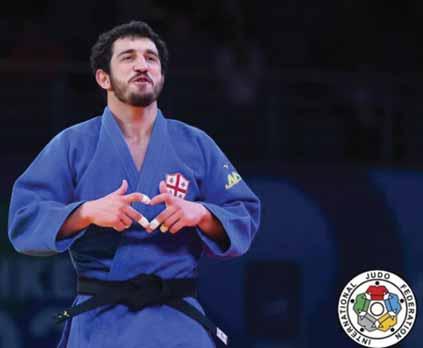
Georgian judoka and Olympic Champion Lasha Bekauri on Sunday defeated his French opponent Paul Livolsi to claim a gold medal at the European Open Championships in Madrid, the Georgian Judo Federation said. He scored the win through ippon in
the 90kg weight category to earn the top result.
Bekauri won the gold medal in the men’s 90 kg event at the 2020 Summer Olympics in Tokyo, Japan. He also won the gold medal in his event at the 2019 Judo World Masters and the 2021 European Judo Championships.
Carrefour Introduces New Football Campaign to Support the National Team of Georgia

In support of the national team, Carrefour, which Majid Al Futtaim owns the exclusive rights to operate in Georgia, is launching a new football campaign, where valued customers will receive special discounts and raffle prizes ahead of the anticipated 2024 European Championship. Football enthusiasts will find all essen-
tial items and products under one roof at Carrefour, including official, national team t-shirts and merchandise. A wide range of snacks, football fan accessories, televisions, and PlayStations are available at the most affordable prices until June 25.
JOIN THE FOOTBALL CHAMPIONSHIP
As part of the campaign, Carrefour will host a FIFA football championship match on June 23 at the Tbilisi Mall branch. A
PUBLISHER & GM
George Sharashidze
COMMERCIAL
DEPARTMENT
Commercial Director: Iva Merabishvili
Marketing Manager: Natalia Chikvaidze
EDITORIAL DEPARTMENT:
Editor-In-Chief: Katie Ruth Davies
total of 24 participants will be selected via Carrefour's official Facebook page to participate in the tournament, and three lucky winners will be chosen and gifted the national team’s official shirts. The first-place winner will receive a PlayStation 5, while the second place winner will be awarded a Samsung Smart Watch.
WIN BIG WITH NATAKHTARI
In collaboration with Natakhtari, Carrefour is offering customers the chance
Journalists: Ana Dumbadze, Vazha Tavberidze, Tony Hanmer, Nugzar B. Ruhadze, Mariam Mtivlishvili, Erekle Poladishvili, Shelbi R. Ankiewicz
Photographer: Aleksei Serov
to win a PlayStation 5! To participate, customers can simply upload a photo of themselves with Natakhtari products on Carrefour's official Facebook and Instagram pages until June 25. Whoever gains the most likes will be named the winner.
Through this campaign, Carrefour highlights its customer-centric approach, continuing to identify ways to provide added value and convenience to its customers, while creating great moments for everyone, everyday.

Website Editor: Katie Ruth Davies
Layout: Misha Mchedlishvili
Webmaster: Sergey Gevenov
Circulation Managers: David Kerdikashvili, David Djandjgava
ADDRESS
1 Melikishvili Str.
Tbilisi, 0179, Georgia
Tel.: +995 32 229 59 19
E: info@georgiatoday.ge F: GeorgiaToday
ADVERTISING & SUBSCRIPTION
+995 555 00 14 46
E-mail: marketing@georgiatoday.ge
Reproducing material, photos and advertisements without prior editorial permission is strictly forbidden. The author is responsible for all material. Rights of authors are preserved. The newspaper is registered in Mtatsminda district court.
Reg. # 06/4-309
GEORGIA TODAY JUNE 14 - 20, 2024 11 CULTURE GEORGIA TODAY
SPORTS
BY TEAM GT
eorgian
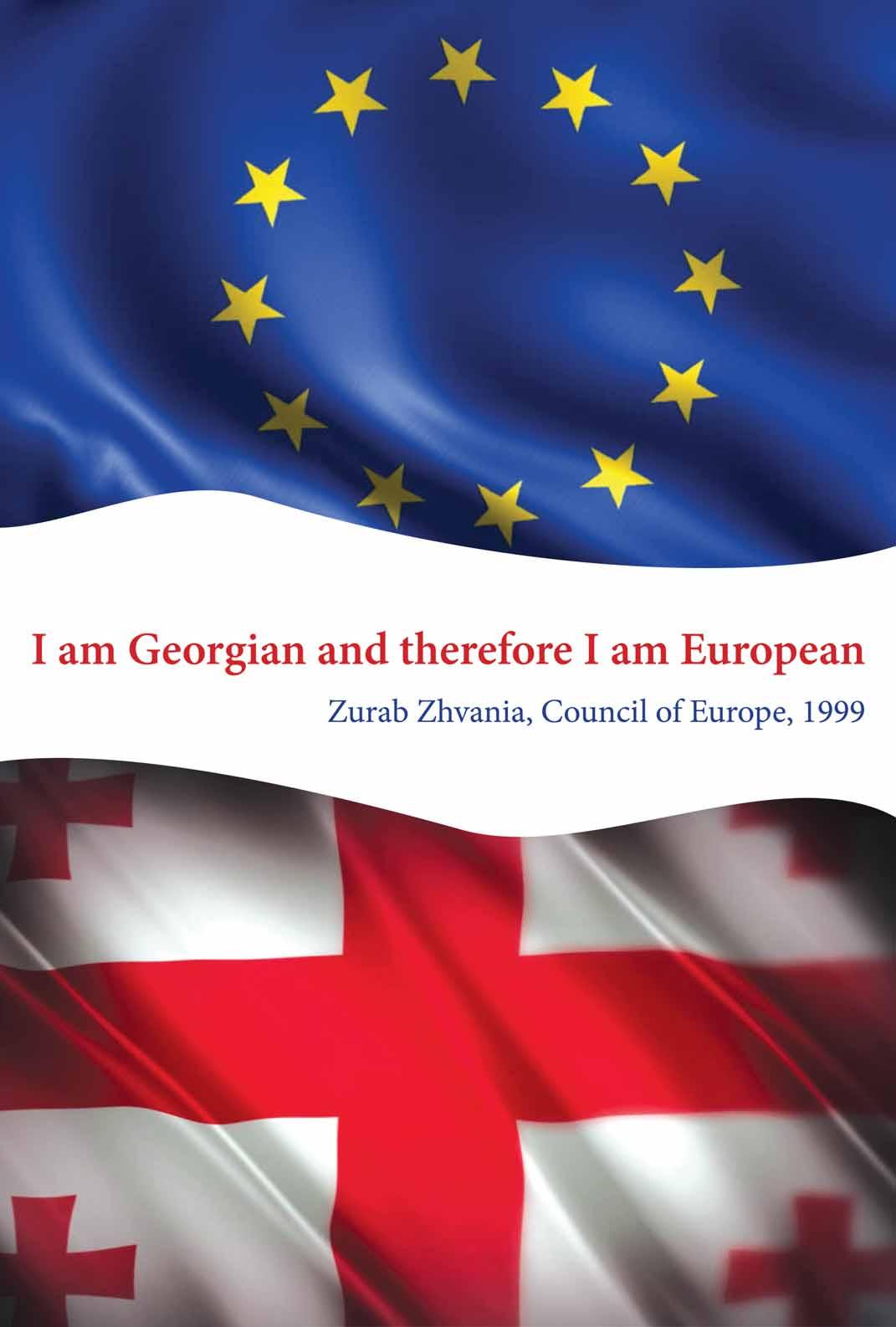












 BY MARIAM MTIVLISHVILI
BY MARIAM MTIVLISHVILI





 BY NUGZAR B. RUHADZE
BY NUGZAR B. RUHADZE



 BY THE SADAGI TEAM
BY THE SADAGI TEAM



 BY IVAN NECHAEV
BY IVAN NECHAEV






